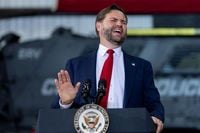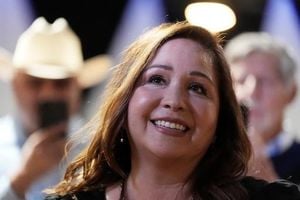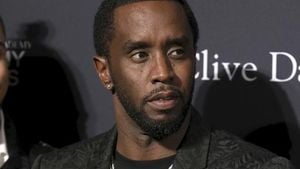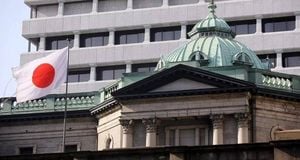When the NFL announced that Puerto Rican superstar Bad Bunny would headline the 2026 Super Bowl Halftime Show, the news set off a firestorm across the American political and cultural landscape. While many fans celebrated the selection of the world’s most streamed artist, critics—particularly from conservative and MAGA circles—reacted with outrage, sparking debates over immigration, LGBTQ+ visibility, and the very soul of America’s biggest sporting event.
On October 1, 2025, Corey Lewandowski, former campaign manager for Donald Trump and a close advisor in his 2024 and 2026 campaigns, appeared on Benny Johnson’s web interview series, “The Benny Show,” to issue a stark warning: U.S. Immigration and Customs Enforcement (ICE) agents would be present at the 2026 Super Bowl, where Bad Bunny is set to perform. According to Variety, Lewandowski declared, “There is nowhere you can provide safe haven to people who are in this country illegally. Not the Super Bowl and nowhere else. We will find you and apprehend you and put you in a detention facility and deport you. Know that is a very real situation under this administration, which is contrary to how it used to be.”
Lewandowski’s comments came as Bad Bunny’s only U.S. appearance for 2026 was confirmed to be the Super Bowl Halftime Show, presented by Apple Music. His highly anticipated “Debí Tirar Más Fotos” World Tour, running from December 2025 through July 2026, notably skips the United States. Bad Bunny himself told I-D magazine in September that his fear of ICE raids played a significant role in his decision. “Fucking ICE could be outside [my concert]. And it’s something that we were talking about and very concerned about,” he explained. He added, “There were many reasons why I didn’t show up in the U.S., and none of them were out of hate — I’ve performed there many times. All of [the shows] have been successful. All of them have been magnificent. I’ve enjoyed connecting with Latinos who have been living in the U.S. But specifically, for a residency here in Puerto Rico, when we are an unincorporated territory of the U.S. … People from the U.S. could come here to see the show.”
But the controversy didn’t stop with immigration. As soon as the NFL’s announcement hit social media, a chorus of conservative voices erupted with criticism, not just over Bad Bunny’s political stances, but also over his artistic choices. MAGA supporters lambasted the singer for his 2020 music video “Yo Perreo Sola,” in which he appeared in three different drag looks. One online MAGA account posted photos of Bad Bunny in drag, writing, “Apparently this is 'Bad Bunny'. The NFL has selected him to be the Super Bowl halftime performer. I'd rather have a colonoscopy without anesthesia than watch that crap.” Another user, however, countered: “He's literally the most streamed artist on the Planet. It's a perfect business decision. Lol.” (Independent)
Conservative commentator Robbie Starbuck, affiliated with the Heritage Foundation, questioned the NFL’s choice, asking, “Is it that hard to pick a unifying music act that doesn't want to peddle woke propaganda? Does this guy really scream American football to anyone? Be for real with me. No one thinks he does. This isn't about music, it's about putting a guy on stage who hates Trump and MAGA.”
Some critics went even further, branding Bad Bunny as “satanic” and an “anti-ICE activist.” The backlash was so intense that calls for a Super Bowl boycott began to trend among right-wing circles. But the pushback wasn’t one-sided. California Governor Gavin Newsom’s office responded with a dose of social media satire. On September 30, 2025, the Governor’s Press Office posted on X (formerly Twitter) in mocking alternating capitals: “I’m bOyCoTtInG ThE SuPeR BoWl bEcAuSe bAd bUnNy dReSsEd iN DrAg,” alongside a viral photo of Vice President JD Vance in drag at a 2012 Yale University Halloween party. The image, which first circulated in late 2024 during the U.S. presidential election season, shows Vance in a skirt, blonde wig, and makeup. A spokesperson for Vance downplayed the photo at the time, saying, “JD put on a bad wig at a party in college – not exactly scandalous.”
The Governor’s Press Office didn’t stop there. Responding to Benny Johnson’s labeling of Bad Bunny as a “massive Trump hater” and “anti-ICE activist,” the account quipped, “Benny calm down, we all know you listen to Bad Bunny lol.” According to The Pink News, these jabs were part of a broader effort by Newsom’s team to lampoon what they saw as overblown conservative outrage. Yet, as Newsom’s office fired back online, the governor himself faced criticism from LGBTQ+ advocates for perceived shifts to the right on trans rights, including a controversial podcast appearance and high-profile interviews with right-wing figures.
All this drama has unfolded against the backdrop of Bad Bunny’s own complex relationship with the United States. The artist, whose real name is Benito Ocasio, has long been an outspoken advocate for Latino and LGBTQ+ communities. His decision to skip U.S. tour dates, he insisted, was not out of animosity toward American fans, but out of real concern for the safety of his audience and his team amid the current political climate. His Puerto Rico residency, he noted, was a way to connect with fans without the added risks associated with potential ICE enforcement at U.S. venues.
Meanwhile, the NFL and Apple Music, both partners in the Halftime Show, have not issued public statements addressing the political storm. The league has faced similar controversies in the past, from Janet Jackson’s infamous 2004 wardrobe malfunction to the backlash against Beyoncé’s politically charged 2016 performance. But few halftime acts have been caught in the crosshairs of America’s culture wars quite like Bad Bunny.
With the Super Bowl still months away, it’s clear that the event will be far more than just a football game or a concert. For some, it’s a flashpoint in the nation’s ongoing debates about immigration, inclusion, and the power of pop culture to challenge—or reinforce—social norms. For others, it’s simply a business decision: booking the world’s most popular artist to perform on the world’s biggest stage.
As the countdown to February 2026 continues, all eyes will be on Las Vegas—not just for the touchdowns, but for the spectacle, the politics, and the ever-present question: just what does it mean to be American in 2026?




